Intimacy means different things to different people. For some, physical closeness is a vital way of expressing love and feeling connected. For others, it may not hold the same importance – and that’s okay. But when two partners experience desire differently, it can create tension, confusion, and emotional distance.
We often hear from people who feel rejected, unwanted, or pressured. Others feel guilty, overwhelmed, or unsure how to explain their feelings. These moments can be painful, and if left unspoken, they can quietly erode the foundation of a relationship.
The truth is, it’s rarely about who’s “right” or “wrong.” It’s about needs not being heard, and feelings not being understood. Counselling offers a space to talk openly – without blame or shame – about desire, boundaries, and connection. It’s a chance to explore what intimacy means to each person, and how to find common ground that feels safe and respectful.
If this feels familiar, you’re not alone. Many couples face this challenge, and with support, it’s possible to rebuild trust and rediscover closeness in ways that work for both of you.
📍We’re here at Personal & Relationship Counselling Plymouth, based in Looe Street. When you’re ready, we’re ready to listen.









